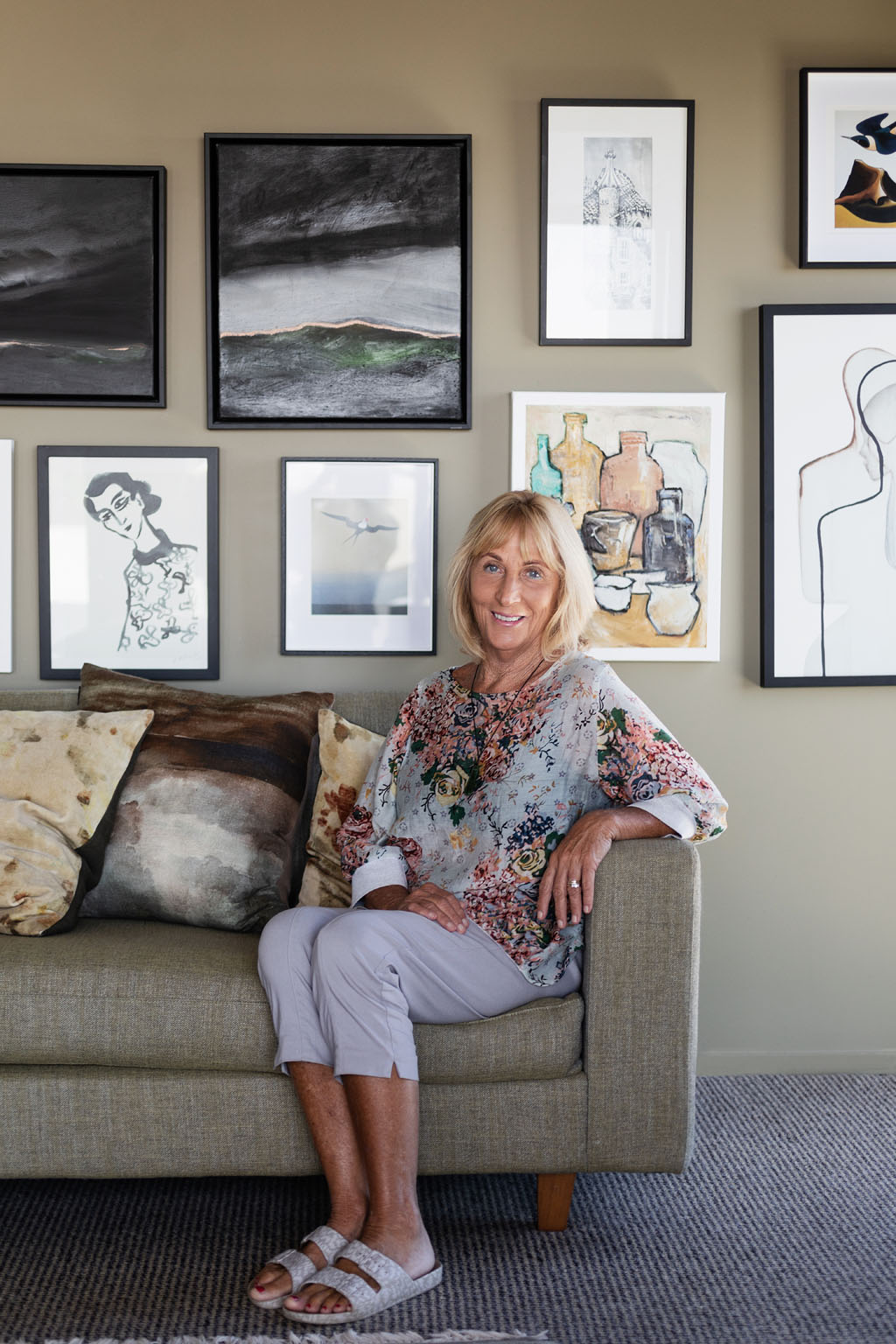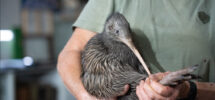
“It all came down to luck,” says Lou Roebuck of how she managed to survive the car accident that claimed her husband Keith over four years ago.
Not expected to live, or even walk again, she’s doing both.
It was sheer luck that a rescue helicopter was near Tokoroa on the night a drunk driver ploughed into Keith and Lou Roebuck.
It was Saturday night 31st October 2020 and the New Plymouth couple were hit on a pedestrian crossing in Tokoroa after watching the All Blacks play Australia on the big screen at a sports bar.
The initial danger for Lou was loss of blood from multiple internal injuries.
Her heart stopped twice on the flight to Waikato Hospital in Hamilton and she had a total of 21 broken bones.
“Six broken ribs, a broken sternum, a smashed shoulder, a compound fracture on her wrist, a bruised spleen, bladder, bowel, and ileac artery, smashed pelvis (which now has screws holding it in place), broken femur, broken leg, smashed knees and smashed ankles. So yeah, pretty munted.”
Lou was also lucky to have escaped brain and spinal injury and suffer no facial wounds. She had 6 fractures to her back but no complete breaks or any sort of spinal cord injury.
“I had lots of little lacerations around my face, little cuts and bruising but I must have protected my head pretty well. I’m thinking I must have landed on this (right) shoulder cos that was completely smashed.”
It was surmised that Keith was hit first and took the full impact of the car. Then the force transferred into Lou and the pair ended up 30m and 50m respectively from the impact site.
Friends Caro and Peter Winstanley had just stepped onto the crossing as Lou and Keith were about to step into the pedestrian refuge in the centre of the road.
“Never saw the car, never heard the car,” Caro says. She and Peter believe the car didn’t have its lights on. “It was literally in the blink of an eye. One moment they were there in front of us and the next they weren’t. We wondered what the hell had happened.”
She remembers the group of four had stopped at the kerbside to check for traffic before crossing. “The irony was, no-one was drinking. The boys might have had a pint but we were just sitting there watching the game. When the match was over we went outside and it was raining so we specifically walked down to the pedestrian crossing, because its a main road and there were lights there.”
The driver from the car came running back down the road to see what he’d hit.
“He thought it was a tree branch at that stage,” Lou understands. “He had a car full of people — five of them I think — he was supposed to be the sober driver.”
Blessedly, Lou can’t remember the accident.
For Peter and Caro, it’s something they try hard to forget and rarely talk about. They still have flashbacks and are thankful they have each other to talk things through.
Lou was initially knocked out cold and when she came round knew Caro instantly.
After the helicopter arrived to take Lou to hospital, Caro and Peter were taken to the police station for their statements. Both remember being drenched and freezing cold.
“We were there for quite a long time and finally left at about 5am.”
Peter had to identify Keith and then they started receiving calls from the family, who by this stage had been told the news by police.
WAIKATO HOSPITAL
Waking up in the hospital all Lou could see were big bright lights above her.
“I thought ‘that’s odd, I must be dreaming’ and so I closed my eyes and must have drifted back off.
“When I woke up again I realised I couldn’t move and was intubated. A nurse said ‘It’s OK but you’ve been in an accident. You and your husband were hit by a car and you’re in Waikato Hospital.’ I realised I was in ICU and then I thought ‘oh my God, where’s Keith?’ But I couldn’t talk so I couldn’t ask. Then they said “Your family’s here and we’re going to bring them in to see you.”
Her daughter Amy came in and from the look on her face Lou knew that Keith was gone.
“She was trying really hard not to cry and whispered in my ear ‘Please don’t die’.
“Her father had died less than a year before Keith and she was so close to both of them. All I could think was this poor girl … I can’t die. My biggest fight for my life was for these kids. I thought ‘I can’t die cos I can’t let these kids go through another death.’
“And then Anthony came in (Keith’s oldest son) and I told him how sorry I was about his dad and he said ‘We’ve got to think about you now, we’ve got to get you through this.’ They were all trying to be so strong.”
“When they left I just lay there and thought ‘F**king hell’.”
After three days in the ICU Lou was shifted to the High Decency unit for several days and then a ward. She wasn’t allowed visitors, apart from family, for the first few weeks.
“I still couldn’t move and felt so vulnerable,” she says of that time.
She recalls being sat on a chair for a shower, her right shoulder and arm useless, her left arm bandaged after an operation to repair a compound fracture in her left wrist (the bone was sticking out) and both legs in plaster. Then the bell goes for an emergency situation and the nurse tells her she’ll be back in a moment. “You’re left shivering and freezing, wet under a towel for ten minutes, petrified I was going to fall off that chair. If I’d moved slightly I probably would have slid off it and there wouldn’t have been a damned thing I could do about it. Sometimes it was so scary in those early days.”
“She had to be hoisted for everything,” Caro says. “She didn’t ever complain but I could see the pain in her eyes. It wasn’t just the pain of that but trying to deal with the fact that Keith was dead.
She was just so broken.”
Lou didn’t eat for quite some time as they thought she may have sustained some internal damage and wouldn’t be able to swallow properly.
“I also felt sick so couldn’t eat. I look back at photos from that time and I got so skinny (about 46 kilos). I didn’t have an appetite for about 2 – 3 months really. I guess my body was using all its reserves for healing. All those broken bones … and then all those operations.”
She also got hospital acquired pneumonia twice.
Lou wasn’t well enough to attend Keith’s funeral, which was held just over three weeks after the accident in the assembly hall at New Plymouth Boys’ High School. “Emotionally too, I don’t think I could have coped.”
But she did watch it online with Caro Winstanley and Lou’s sister-in-law Bev.
“I was so proud of the kids and how they spoke,” says Lou, and I was surprised to find myself laughing at things said about Keith. I’ve watched it twice since then and each time I howl and howl, but now I don’t know that I ever want to take myself back to that deep grief. I just want to remember parts of it and things about him that made me smile.”
She was in Waikato Hospital for four weeks and then Taranaki Base Hospital for another four months.
CAPTION – Image 5
Lou’s running friends would bring coffee, a bridge pie and laughter.
“Looking back at the photos we took, we’re all laughing but … those girls must have gone out of there (after visiting me) and cried.”
COMING HOME
Most of her close friends and family were there on the day Lou moved back into her Strandon home. Initially she had a couple of home visits, then spent one night there each week for another couple of weeks, to ease the transition.
“I absolutely broke down,” Lou says of that first visit home.
“All the kids were here and I just felt Keith. I still imagine him biking down the drive, yelling up the stairs, ‘will you get me some breakfast? In those early days you could feel him all around.
I’m not the only person whose lost a husband but god it’s such a hard thing you know, that your life, overnight has changed so completely.
Lou’s son Ben moved home to care for her as she recovered.
Her friends set up a roster and people would bring Lou and her family home-cooked meals each night.
“Amber from Greg Brien Physiotherapy used to come here and I remember my first goal was to walk to the letterbox. Then the next goal was to the corner of the street. Then it was to the intersection with the next street. Each time I thought ‘I’m never going to walk that far’ but every time I did.
“I remember with her one day I was feeling really sad and started to cry and asked ‘am I ever going to be able to get back to looking after myself and my grandchildren? And she said ‘yes 100% you’re going to be able to. Within a couple of months I’m going to have you walking around the block.” Her positivity made me think ‘Right, I’m going to get there.’
What Lou didn’t know was that her doctors had warned her family that her recovery would take years and it was likely she may never walk again.
“Thankfully they only told me I would be non-weight bearing for 12 weeks and then they were going to rehabilitate me. Twelve weeks seemed like an age as Keith and I had always been so active. I’d just focus on each step of the process.”
She was house-bound for two years and had her last surgery in 2022 (her right knee).
She still has no conscious recollection of the accident, but it seems her body remembers.
“I had one time when I was back at home, where I was drifting off to sleep and felt this almighty impact on me and I was like ‘Ben what the hell was that?’ It felt like an earthquake or something. But I talked to my doctor and he thought it was likely a flashback.”
MY LIFE NOW
“I’ve changed hugely physically.
“Keith would literally kick me out of bed in the mornings and make me do stuff … jokingly, but he’d rip all the covers off me and make me get up. Sunday was the only day you were allowed to lie in bed.
“Three mornings a week I would run with my friends. I’d go swimming with Keith. Physically it’s annoying I can’t just get on my bike, or go for a run, go for a hike with friends, have golf lessons, play tennis.”
Her goals these days are to keep as physically active as she is able to, which means doing something most days. Going to the gym, walking and aqua jogging are her activities now.
This year she plans to go for a morning walk then meet up with her old jogging buddies for their post-run coffee.
“Social interactions with people have been my saviour … and my grandchildren. Those kids have been my drive to stay around — to watch them develop.
“Of course it’s bittersweet that Keith isn’t there to watch them grow too.
He was a bit of a naughty grandad, swearing, and singing, being silly and taking them on adventures. He was an active grandad.”
She works as a ‘virtual nurse’ three days a week for Coastal Medical from an office in her home, which she loves. “Though I’m a registered nurse I’m not physically able to do a lot, so phoning people in this virtual role is perfect for me.”
She couldn’t sleep well for years because of the pain.
“I sleep really well now but can’t lie on my right side (because of the shoulder). I still have a bit of pain in my knees and ankles, especially my left leg but I’m used to it and it’s my new normal now.”
Future plans died with Keith.
The motorhome they used regularly was sold and it’s only recently she has felt confident enough to travel again, flying to Australia to see her other son and his family.
Keith was the organiser for their trips and family get-togethers, the life and soul of any party.
“There’s no music now … when he was training he’d have the doors open and the music blaring out. But there’s no-one quite like him and I really miss that.”
This year she’s been working on her home, getting things done that Keith would normally take care of, and establishing new social routines like drinks with her friends once a month.
“You can either curl up on the couch and feel sorry for yourself, get depressed, or you just have to face life,” she says pragmatically. “I think having kids and grandchildren is huge … there’s always something to look forward to, birthdays, sports, school … it’s neat just watching them.”
During the whole ordeal she never ever wanted to give up on life.
“The kids … I couldn’t leave them, not after they’d already lost Keith.”
One analogy about grief that resonated with her was that it was like the sea.
“Sometimes it’s calm, sometimes there’s a few little ripples, and other times it’s like a tsunami. But it’s always there.
“Some days I feel pretty overwhelmed with it and you never know what’s going to trigger it, but suddenly your mind is back there.”
Her advice to others struggling with grief is simple.
“Surround yourself with family and good friends, and be as active as you can.
“If I’m feeling a bit down I’ll just go for a walk along the beach and come back feeling alive again.”
“She’s so resilient, dedicated and focussed,” says Caro. “And disciplined with what she needs to do to come right. To watch her progress and strive to reach a a goal, even though she’s hurting, is incredibly inspirational. To be where she is now, is nothing short of a miracle. She can walk 6-8 k … I don’t know if that’s a good thing cos she feels it afterwards. But her courage is just so impressive.”
Caro carries a special memory of her friends just before the accident.
“Keith had his arm around her and an umbrella up as they walked across the crossing. It reminded me of Winnie the Pooh and Piglet and is a nice memory to hold onto. He was protecting her … that’s why she’s here.”


